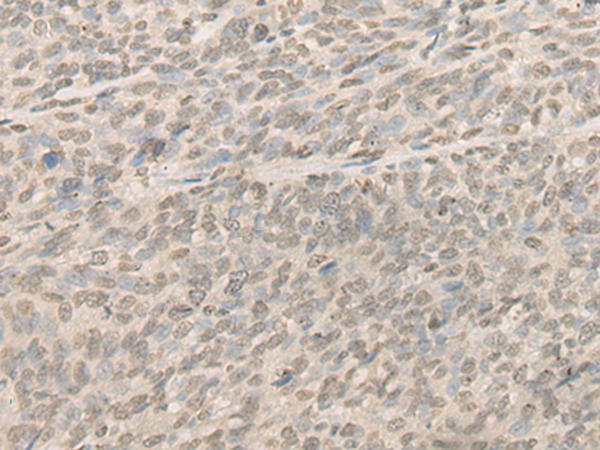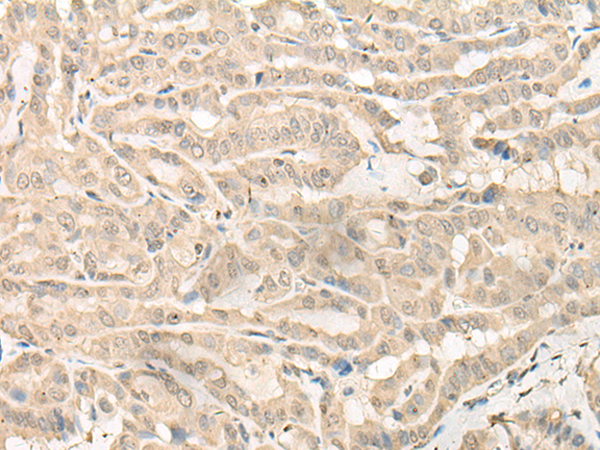

| WB | 咨询技术 | Human,Mouse,Rat |
| IF | 咨询技术 | Human,Mouse,Rat |
| IHC | 1/25-1/100 | Human,Mouse,Rat |
| ICC | 技术咨询 | Human,Mouse,Rat |
| FCM | 咨询技术 | Human,Mouse,Rat |
| Elisa | 1/5000-1/10000 | Human,Mouse,Rat |
| Aliases | CAR; CAR1; MB67 |
| Host/Isotype | Rabbit IgG |
| Antibody Type | Primary antibody |
| Storage | Store at 4°C short term. Aliquot and store at -20°C long term. Avoid freeze/thaw cycles. |
| Species Reactivity | Human |
| Immunogen | Fusion protein of human NR1I3 |
| Formulation | Purified antibody in PBS with 0.05% sodium azide and 50% glycerol. |
+ +
以下是关于NR1I3抗体的3篇参考文献的简要列举(注:部分文献信息可能需结合实际情况核实或更新):
---
1. **文献名称**:*"Development and characterization of a specific polyclonal antibody against human constitutive androstane receptor (CAR/NR1I3)"*
**作者**:Zhang Y, et al.
**摘要**:该研究报道了一种针对人源NR1I3(CAR)的多克隆抗体的制备与验证。通过Western blot和免疫组化实验,证明该抗体能特异性识别CAR蛋白,并用于检测肝细胞中CAR的表达水平及其核定位,为研究CAR在药物代谢中的功能提供了工具。
2. **文献名称**:*"Role of CAR/NR1I3 in acetaminophen-induced hepatotoxicity revealed by antibody-mediated knockdown"*
**作者**:Cheng X, et al.
**摘要**:本研究利用NR1I3抗体探究CAR受体在对乙酰氨基酚肝毒性中的作用。通过免疫沉淀和染色质免疫共沉淀(ChIP),发现CAR与肝脏解毒基因的调控区域结合,抗体介导的蛋白抑制实验进一步揭示了CAR在药物代谢中的保护机制。
3. **文献名称**:*"Tissue-specific expression profiling of nuclear receptor CAR/NR1I3 using validated immunohistochemical markers"*
**作者**:Thompson EE, et al.
**摘要**:文章系统评估了多种NR1I3抗体在人和小鼠组织中的特异性,筛选出适用于免疫组化的高特异性抗体,并发现CAR在肝脏、肠道中高表达,与PXR受体存在共定位现象,为研究其生理功能提供了组织分布依据。
---
如需更准确的文献信息,建议通过PubMed或Google Scholar搜索关键词“NR1I3 antibody”、“CAR antibody validation”获取最新研究。
The NR1I3 antibody is designed to target the nuclear receptor subfamily 1. group I, member 3 (NR1I3), commonly known as the constitutive androstane receptor (CAR). CAR is a ligand-activated transcription factor primarily expressed in the liver and intestine, playing a critical role in regulating genes involved in drug metabolism, energy homeostasis, and detoxification. It forms heterodimers with the retinoid X receptor (RXR) to bind specific DNA response elements, modulating the expression of cytochrome P450 enzymes (e.g., CYP2B, CYP3A) and transporters (e.g., MRP2). CAR is activated by diverse xenobiotics and endogenous compounds, influencing drug-drug interactions, bilirubin clearance, and bile acid homeostasis. Dysregulation of CAR has been implicated in liver diseases, metabolic disorders, and cancer.
NR1I3 antibodies are essential tools for studying CAR's expression, localization, and function in both physiological and pathological contexts. These antibodies, typically raised in rabbits or mice, enable detection via techniques like Western blotting, immunohistochemistry, and immunofluorescence. Validated antibodies help assess CAR levels in tissue samples, cell lines, or animal models, particularly in studies exploring drug-induced hepatotoxicity, cholestasis, or metabolic reprogramming in tumors. Specificity is confirmed using knockout controls or competitive assays. By facilitating CAR-related research, NR1I3 antibodies contribute to understanding its role in disease mechanisms and therapeutic targeting, bridging gaps between basic science and clinical applications.
×